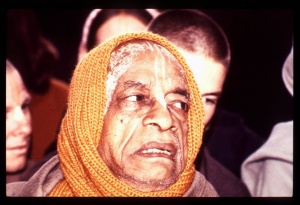CC Adi 17.307: Difference between revisions
m (1 revision(s)) |
(Vanibot #0054 edit - transform synonyms into clickable links, which search similar occurrences) |
||
| (One intermediate revision by one other user not shown) | |||
| Line 1: | Line 1: | ||
{{ | [[Category:Sri Caitanya-caritamrta - Adi-lila Chapter 17|C307]] | ||
<div style="float:left">'''[[Sri Caitanya-caritamrta|Śrī Caitanya-caritāmṛta]] - [[CC Adi|Ādi-līlā]] - [[CC Adi 17|Chapter 17: The Pastimes of Lord Caitanya Mahāprabhu in His Youth]]'''</div> | |||
<div style="float:right">[[File:Go-previous.png|link=CC Adi 17.306|Ādi-līlā 17.306]] '''[[CC Adi 17.306|Ādi-līlā 17.306]] - [[CC Adi 17.308|Ādi-līlā 17.308]]''' [[File:Go-next.png|link=CC Adi 17.308|Ādi-līlā 17.308]]</div> | |||
{{CompareVersions|CC|Adi 17.307|CC 1975|CC 1996}} | |||
{{RandomImage}} | |||
==== TEXT 307 ==== | ==== TEXT 307 ==== | ||
<div | <div class="verse"> | ||
tarke ihā nāhi māne yei durācāra | :tarke ihā nāhi māne yei durācāra | ||
kumbhīpāke pace, tāra nāhika nistāra | :kumbhīpāke pace, tāra nāhika nistāra | ||
</div> | </div> | ||
| Line 12: | Line 16: | ||
==== SYNONYMS ==== | ==== SYNONYMS ==== | ||
<div | <div class="synonyms"> | ||
''[//vanipedia.org/wiki/Special:VaniSearch?s=tarke&tab=syno_o&ds=1 tarke]'' — by arguments; ''[//vanipedia.org/wiki/Special:VaniSearch?s=ihā&tab=syno_o&ds=1 ihā]'' — this; ''[//vanipedia.org/wiki/Special:VaniSearch?s=nāhi&tab=syno_o&ds=1 nāhi]'' — not; ''[//vanipedia.org/wiki/Special:VaniSearch?s=māne&tab=syno_o&ds=1 māne]'' — accepts; ''[//vanipedia.org/wiki/Special:VaniSearch?s=yei&tab=syno_o&ds=1 yei]'' — anyone who; ''[//vanipedia.org/wiki/Special:VaniSearch?s=durācāra&tab=syno_o&ds=1 durācāra]'' — debauchee; ''[//vanipedia.org/wiki/Special:VaniSearch?s=kumbhī&tab=syno_o&ds=1 kumbhī]-[//vanipedia.org/wiki/Special:VaniSearch?s=pāke&tab=syno_o&ds=1 pāke]'' — in the boiling oil of hell; ''[//vanipedia.org/wiki/Special:VaniSearch?s=pace&tab=syno_o&ds=1 pace]'' — boils; ''[//vanipedia.org/wiki/Special:VaniSearch?s=tāra&tab=syno_o&ds=1 tāra]'' — his; ''[//vanipedia.org/wiki/Special:VaniSearch?s=nāhika&tab=syno_o&ds=1 nāhika]'' — there is not; ''[//vanipedia.org/wiki/Special:VaniSearch?s=nistāra&tab=syno_o&ds=1 nistāra]'' — deliverance. | |||
</div> | </div> | ||
| Line 19: | Line 23: | ||
==== TRANSLATION ==== | ==== TRANSLATION ==== | ||
<div | <div class="translation"> | ||
If one simply adheres to mundane arguments and therefore does not accept this, he will boil in the hell of Kumbhīpāka. For him there is no deliverance. | If one simply adheres to mundane arguments and therefore does not accept this, he will boil in the hell of Kumbhīpāka. For him there is no deliverance. | ||
</div> | </div> | ||
| Line 26: | Line 30: | ||
==== PURPORT ==== | ==== PURPORT ==== | ||
<div | <div class="purport"> | ||
Kumbhīpāka, a type of hellish condition, is described in Śrīmad-Bhāgavatam ([[SB 5.26.13]]), wherein it is said that a person who cooks living birds and beasts to satisfy his tongue is brought before Yamarāja after death and punished in the Kumbhīpāka hell. There he is put into boiling oil called kumbhī-pāka, from which there is no deliverance. Kumbhīpāka is meant for persons who are unnecessarily envious. Those who are envious of the activities of Śrī Caitanya Mahāprabhu are punished in that hellish condition. | Kumbhīpāka, a type of hellish condition, is described in [[Srimad-Bhagavatam|''Śrīmad-Bhāgavatam'']] ([[SB 5.26.13]]), wherein it is said that a person who cooks living birds and beasts to satisfy his tongue is brought before Yamarāja after death and punished in the Kumbhīpāka hell. There he is put into boiling oil called ''kumbhī-pāka'', from which there is no deliverance. Kumbhīpāka is meant for persons who are unnecessarily envious. Those who are envious of the activities of Śrī Caitanya Mahāprabhu are punished in that hellish condition. | ||
</div> | </div> | ||
__NOTOC__ | |||
<div style="float:right; clear:both;">[[File:Go-previous.png|link=CC Adi 17.306|Ādi-līlā 17.306]] '''[[CC Adi 17.306|Ādi-līlā 17.306]] - [[CC Adi 17.308|Ādi-līlā 17.308]]''' [[File:Go-next.png|link=CC Adi 17.308|Ādi-līlā 17.308]]</div> | |||
__NOTOC__ | |||
__NOEDITSECTION__ | |||
Latest revision as of 18:42, 19 February 2024

A.C. Bhaktivedanta Swami Prabhupada
TEXT 307
- tarke ihā nāhi māne yei durācāra
- kumbhīpāke pace, tāra nāhika nistāra
SYNONYMS
tarke — by arguments; ihā — this; nāhi — not; māne — accepts; yei — anyone who; durācāra — debauchee; kumbhī-pāke — in the boiling oil of hell; pace — boils; tāra — his; nāhika — there is not; nistāra — deliverance.
TRANSLATION
If one simply adheres to mundane arguments and therefore does not accept this, he will boil in the hell of Kumbhīpāka. For him there is no deliverance.
PURPORT
Kumbhīpāka, a type of hellish condition, is described in Śrīmad-Bhāgavatam (SB 5.26.13), wherein it is said that a person who cooks living birds and beasts to satisfy his tongue is brought before Yamarāja after death and punished in the Kumbhīpāka hell. There he is put into boiling oil called kumbhī-pāka, from which there is no deliverance. Kumbhīpāka is meant for persons who are unnecessarily envious. Those who are envious of the activities of Śrī Caitanya Mahāprabhu are punished in that hellish condition.